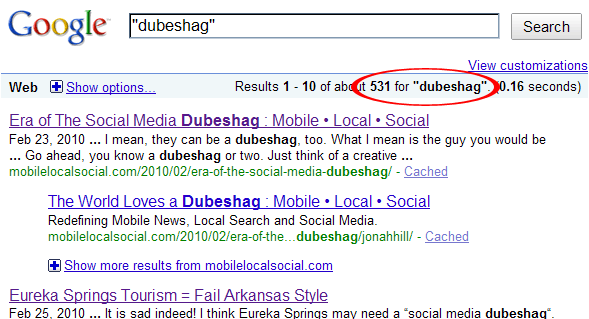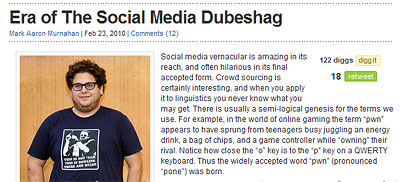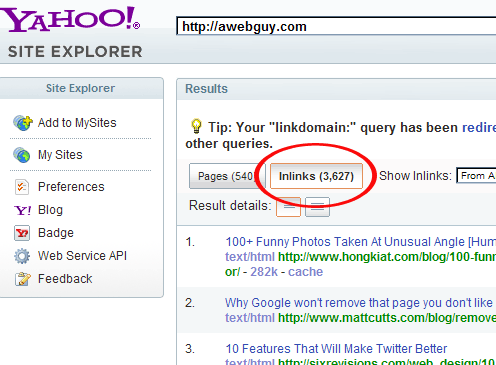
There are good SEO (search engine optimizers) and there are bad SEO, and if you cannot tell the difference, your money and time will be wasted. I am going to give you some third party objective tools to tell the difference between good and bad SEO. These can help you to determine whether yours is working, whether you have hired it out, you are seeking to hire it out, or you are venturing into the ever-popular DIY SEO. The information I will provide in this article also includes some great SEO tools just to satisfy your curiosity. This can help, in case you wondered why there are not more people coming to your website, or to estimate how well your competition is doing. First, I want to be sure that you understand what SEO is and why good SEO is important, so I will start with that.
Why Good SEO is Important
We should first establish that it is important to be listed when somebody searches the Internet looking for what you offer. Searching the Internet is the most common way for people to find a business. If people do not find you, they will find somebody else. Obviously, they will find your competition. Count on it!
I will be really basic for a moment, in case you are totally unfamiliar with SEO. In this article, I will use the term SEO as both the field of search engine optimization (the art and science) as well as search engine optimizer (the person). In basic terms, SEO involves placing your website at the top of a list when somebody performs a search on the Internet. SEO also has a lot to do with making sure that when your link is found in a search, people will click on it, read what you have to say, and take an action such as buy what you have to sell, tell their friends, fill out a form, call you on the phone, and etcetera. These are the things that will produce more business for your company. It really involves a lot of different areas of art and science, so I want to give you some ways to measure both of these things.
Now, let us assume for a moment that good SEO actually exists. It is not a unicorn chase, and it is not some VooDoo witchcraft. Somebody actually is at the top of those searches, they are making sales, and there are reasons for it. So, let’s look at this from a standpoint that there actually is such a thing as good SEO for a moment, please? After all, we can be pretty sure that there is a reason the company at the top of a search for, let’s say, “travel” is not just a brand new company with a $400 budget and 13 incoming links to their site. No, it does not happen that way … ever.
Tools of the SEO Trade
Good SEO is not just made up of a couple of big factors. Yes, there are some big things we look at, but there really are a lot of little things that make up the big picture. Some of the factors are specifics about the website itself, such as the programming code, the servers, XML sitemaps, robots.txt, text content, link structure, keyword usage, and much more. There are a whole lot of pieces to the puzzle of the website itself that add up to make a difference. You have to get those things just right, and have every piece in place to achieve high search engine ranking for competitive search terms. That is to say, the things people actually search for when they need you. Then, there are the things that exist in the world outside of your website. These are things that a lot of website owners often feel are a bit out of their control, or really hard to improve. It is not so hard, but it does take some work. When there is work to be done, there are tools for that work. My father was a craftsman, and he always expressed the importance of using the right tool for the job. If you use the right tools, the job will always go much smoother. My father was really on to something.
Understanding SEO is Not Like Understanding “Rocket Surgery”
SEO does not require a degree in “rocket surgery” (rocket science and brain surgery). A lot of people will try to do some, if not all, of their SEO on their own, and it really can help. I respect anybody who wants to try to build their search engine optimization. Having people understand that SEO is important and that it actually works when done properly is one of the biggest hurdles in my job. In fact, I do everything in my power to be sure my clients and prospective clients understand SEO enough to help themselves. I tell them to read the “Google SEO Starter Guide“. I teach them the good reasons to blog, and I want them to have a better understanding of SEO. Most good SEO will generally try their best to be helpful, because they equate their success with the client’s success. They realize that it is a joint effort. Good SEO know that when they make clients massively successful, they have a lot easier career path. It is why people who Google the term SEO lessons find me at or very near the top. I want people to understand how and why it works. That makes my job much easier.
One of the biggest factors of SEO is backlinks, or links that point to your site from other websites. As you surely understand by now, this is not a silver bullet, but it is a huge factor. So let’s look at link building for a moment, and how to see if you or your SEO are doing a good job.
How to Check for Backlinks (incoming links)
Since a primary factor of good SEO is backlinks, we need to know how to check for them and monitor them. When I say backlinks, I mean links coming to your website from other websites. This is the biggest factor of Google’s PageRank algorithm, and it is what will make the difference between two otherwise equal websites. One with a lot of high-quality incoming links will be ranked, while the other may be totally invisible to search engines, or somewhere between. This is so important that if you could just see me right now, I am jumping up and down and screaming.
Most SEO fail at link building. They get it totally wrong, and their link strategy fails miserably. If you want to know why, I strongly suggest reading this article: “SEO Backlinks: Why Most SEO Fail at Link Building“.
I will give you some tools to check for backlinks. Each of these are useful, but for the most comprehensive look at incoming links, any SEO knows to use Yahoo Site Explorer. By default, it will show you the links for the particular page, so if you enter your website, be sure that you click the “inlinks” button and then select links to the entire site rather than just looking at the home page. After all, people link to the pages they like, and not just link to the homepage and tell people to look for it. Only television stations do that, and perhaps you have heard what kind of trouble they are in these days.
Your search for backlinks should look something like this search that shows tens of thousands of “inlinks” to my blog or like this search excluding internal links.
Another useful tool for determining incoming links and whether they are doing any good is to look at SEOmoz Linkscape. Linkscape will also show your mozRank, which is similar to Google’s PageRank but, in many people’s opinion, more useful.
It seems that most people are confused about backlinks. High-quality backlinks do not just mean any link from any website, and they do not mean just any type of link. The quality of the linking website makes a big difference in the quality of the link. Also, a link coming from a picture is not all that great, but a link from text is fantastic. Wait, but not just any text. A link that points to you with the words “pink ponies for sale” is not so great if you do not have any pink ponies to sell. You want links that are relevant to what you offer, and links that benefit your site. This is where Open Site Explorer can be handy. Open Site Explorer (another SEOmoz tool) will show you which links are valuable to you. It will tell you the actual text within the links pointing to your site (e.g. pink ponies for sale), whether they are “nofollow” links or “dofollow” links (which is another blog post), it will tell you the domains that link to you (e.g. facebook.com), and even how many domains link to them (which is also important). There is a lot more functionality to Open Site Explorer than I will go into here, so be sure to check it out. If it starts to feel like you are just tinkering with useless information, then you are getting the picture about why there are people who actually do this for a living.
Now that you know a little about checking for links, you may also like to know how to discover new ones as they arrive. For this, you can keep checking back, which I suggest anyway, but you can also set up a Google Alert to email you or monitor the RSS feed for new links coming in. That is another blog post, but what we want here are ways to decipher good SEO from bad SEO. So, let’s look at some tools that examine good or bad on-site SEO. This is to say, the things about the website itself that are working correctly, or need some tuning.
SEO Website Readiness Tools
Is the website ready for the incoming links? Let’s find out. I know that I probably spent too much of your time with that drawn out portion about incoming links. Backlinks really are very important … extremely important … but there is more. If you are still with me, I want to share some good SEO tools that will help you to uncover on-site issues that may be stumping your search engine optimization efforts. Running your website through these free SEO tools will help you find things that you can often fix quickly and relatively easily. If you test your website with these tools, and fix it as directed, your SEO will get better. If you are trying to determine a good SEO from a bad SEO, their website should be standing tall in these tests.
Note, that a good SEO also knows which “rules” to break. Nobody will have this all just perfect, because sometimes you just have to break the rules to get the results you want. For example, my site will not validate as XHTML Strict, because I use Disqus commenting system, TweetMeme for people to easily share my articles on Twitter, Apture for cool content display, and I use an anchor target in some of my links so that pages open in a new window. This is OK, because I know which trade-offs are worthwhile. However, the SEO’s own website should provide a good indication of their SEO knowledge. I understand the whole excuse of “the plumber with leaky pipes” (I have been guilty, too), but this is not a good excuse! Any good SEO should be able to show some pretty impressive results with their own website. I find a lot of people trying to sell SEO services who have very few incoming links, and really rotten rankings for their targeted keywords. Try these tests to compare SEO:
- HubSpot Website Grader
- SEOmoz Toolbox (an assortment of good SEO tools)
- W3C Markup Validation Service
Website Traffic Estimates and SEO Website Age
If you are comparing SEO, you should know a couple of key things about them. Does anybody know they exist? You can find a really quick answer to this question by checking their Alexa.com rankings and see their estimated website traffic. This only gives a reasonable estimate based on sample data, but it can definitely tell you a lot about the SEO. If they are unknown there is a reason, and there are no good excuses for it. There is also the often more definitive Quantcast, but a lot of SEO do not wish to share that much data.
I see a lot of SEO with new domain names. This is not always a red flag, but it can be a sign that they are either new, or their previous domain was banned by search engines for abuse. It happens more than you may imagine. This is not the kind of SEO you want to do business with. If they have been banned, you can bet some of their clients have been penalized as well. I said that a new domain is not always a red flag, because there are a few newer SEO who have talent, or may just be beginning their freelance career. However, if their company website is new or unranked, they better have a really good sales pitch. You can look up domain ownership with a WHOIS tool such as YourNew.com WHOIS Lookup or DomainTools.com
Content Creation is Important to Good SEO
Content creation is where many of these SEO factors come into play. A great looking website that is easily indexed by search engines is a good start. Now let us consider content production. If the website does not have good content that includes topics and keywords people search for, it will not matter. You must have something fantastic to offer once the website visitors get there. This is where a lot of the art of SEO comes into play. This is where marketing talent and creative content really make a huge difference between success or failure. How important is creativity in marketing? The easy answer is that it is absolutely critical. Great website content is what creates a desire to buy what you sell, and is also the biggest factor in that important SEO goal I wrote about above. It builds links! If people like what you have to share, and if they find your website content to be useful to them or somebody they know, they will share it. They may tweet it, digg it, stumble it, facebook it, or blog about it, and that creates links.
I explained that incoming links are the most important off-site factor in good SEO. This is an undisputed fact in my industry. Now I want to explain that you do not get those backlinks by taking a pink pony ride with one of the SEO offering to add your website to a squillion search engines and directories. No, that is not how this works. That is how the bad SEO will often try to get your money. You will get the best links with great content, and being useful to others. Even then, good SEO results only happen if you make all the other pieces fit just right.
By the way, good SEO also means they read it all the way to the bottom of the page.


